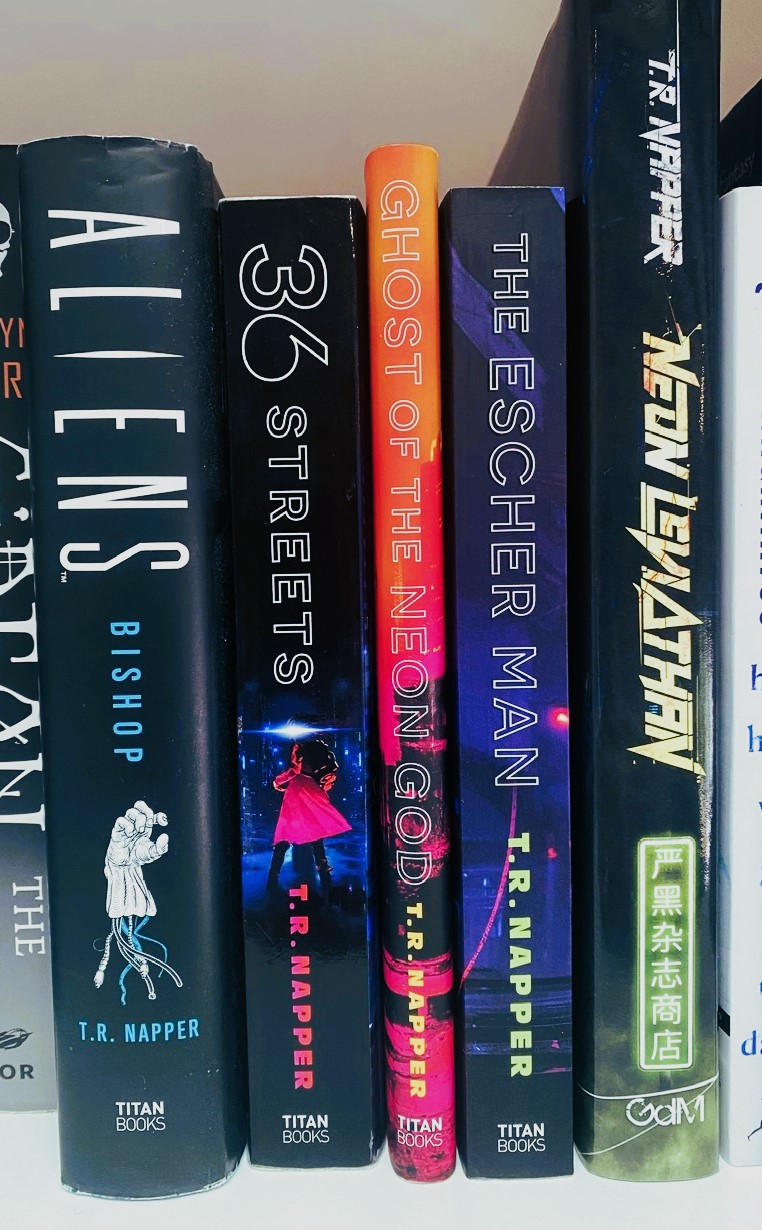The Escher Man took me ten years to write. Aliens: Bishop took five months. Ghost of the Neon God was a short short story, then two short stories, then a final expansion into a novella. Three books, three radically different paths.
(click on the sun icon in the top right hand corner if you prefer to read black script on white).
I’m writing this because The Escher Man has just been published, and there’s an obvious measure of relief, and pride, in seeing that arduous and tortuous journey completed. But it’s also made me think about the writing process.
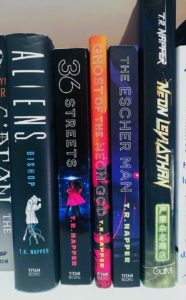
The path to writing THE END on a manuscript is difficult to explain because of this paradox: there’s no blueprint out there, showing you how to get from A to B (I mean, there is, by writing hucksters that try to sell you a formula, but let’s put that exception aside), and yet every journey has something to teach the aspiring writer.
I’m obsessed with the craft of writing. I spend hours on YouTube watching writers talking about the creative process. Genre authors, literary, screen. Contemporary writers and where I can find it, video of authors from the past. The process is endlessly fascinating to me in part because it is ineffable: what will work for each individual and why is never quantifiable.
So why this article then? If every experience is different, if even my own is different from book to book, what is the value of talking about it beyond, say, bullshit platitudes like: every journey is different, or there’s no one right way to write a book?
Well, here’s the thing: bad authors plagiarise, good authors steal. Over the years I’ve cherry picked the methods most suited to me. For example, Graham Greene wrote 500 words a day every day. That suits me perfectly. A slow, steady pace, with iron discipline. So I adopted it. Others I haven’t stolen, but stumbled across. For example: my need to put aside a novel for a year (or more) before I do the final edit. I assumed for a long time that this was a flaw in my process – a type of creative procrastination – until I watched an interview with Taika Waititi, who said that he did exactly the same thing.
So when I explain, briefly, the three methods I went through below, it’s not as a formula. It’s as a set of approaches that you might want to steal, or as examples that may happen to gel with your own, and let you know you’re not crazy.
Method one: The Fix Up
The fix up was a more common phenomenon in decades past. Put simply, an author would publish a short story (or a series of short stories), and sometimes the story(ies) would get expanded into a full length novel. The Martian Chronicles (1950), A Canticle for Leibowitz (1959), Flowers for Algernon (1966), To Your Scattered Bodies Go (1971), and Ender’s Game (1985) are all examples of this. It is perhaps no coincidence that this was more prevalent during a time when short stories were far better paid. It was worth doing them back then, financially as well as artistically, and so some of those initially brief excursions turned out to have a concept good enough they could be expanded to a novel.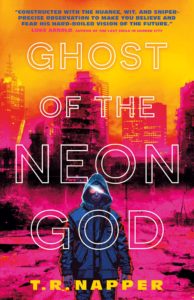
I wrote Ghost of a Neon God (note the slightly different name) as a short story, which was subsequently published by Interzone in 2017. And I was done. Pleased that it was published, happy with the story. Or was I?
It nagged at me, wanting more. What happened next to Jackson Nguyen? This might (might) have been one of those all-so-rare occasions where it’s not the work ethic telling you to write, but the muse.
So I did, and the second story, A Vast Silence, was published in 2021 in The Magazine of Fantasy and Science Fiction. A great magazine. The story even got shortlisted for an Aurealis Award, so I should have been satisfied but that fucking muse just couldn’t let it go, could she?
And so I wrote a third section, longer than the first two combined, and that became the novella, Ghost of the Neon God.
My first observation on the process would be this: the fixup is harder than writing a longer work straight up. The three sections have to be consistent with each other in terms of tone and style (difficult when it’s been stop-start over five years), they have to be seamless so the reader can’t see any obvious joins, and they have to flow between each other in a way that no information seems repeated or inconsistent. One minor detail in the second story, for example, might have ripple effects each way, towards the beginning and the end.
My second observation: if you can’t let a story go, then don’t.
Method two: the Fever Dream
Oh boy. Slow writer gets asked to write a novel in 4.5 months. Slow writer says no. Writer’s friends slap him upside the head, writer’s agent twists his arm. Slow writer thinks about how epically fucking cool the Aliens franchise is and changes his mind to yes.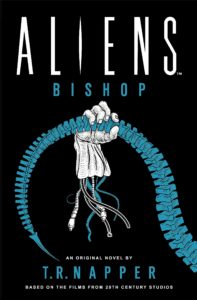
Seven days a week, 4.5 months. No days off, save Christmas Day 2022. I can’t really tell you how I did it, because it was and is a blur. This is what I remember: I had a goal of 1500 good words a day. If I finished at 3pm, I’d rest. If I was still going at midnight, I was still going at midnight. I worked a job in the disability sector during this period, and had two young children at home. Like I said: fever dream.
My was name was going to be on the front cover, and I love the first two movies in this franchise – Aliens, in particular, being one of those seminal films I watched when I was way too young to do so – so I was determined to write a book worthy of that universe. I did, I think, with fandom embracing it.
But how? Fuck knows, I can’t remember. Would I do it again? Not in so short a time, no. Some authors are suited to a fast pace, and can churn out good copy quickly. I can’t. Or I can’t and also keep my sanity intact.
Observation one: Deadlines are a hell of a drug, it is true, and I like a deadline insofar as it focusses my mind and helps me prioritise. But a deadline is not a magic wand, not quite. It has to be balanced against the natural speed of the author, and the other commitments they have in their lives.
Observation two: your pace is your pace. I thought you said no platitudes Napper? Okay okay. Your pace is your pace, but no bullshit excuses. If I don’t feel the muse, I write. If I’m in a bad mood, I write. I turn up at the desk, every day.
Method three: the Odyssey
I initially called this the ultra-marathon, but that would be a short companionable stroll compared what actually occurred. Odysseus took ten years to get from Troy to Ithaca, so let’s go with that.
Of the three examples in this article, I’m proudest of this book. Not because it is the ‘best’ (whatever that means), but because it was by far the toughest. The toughest to write, to sell, and conceptually the hardest to execute.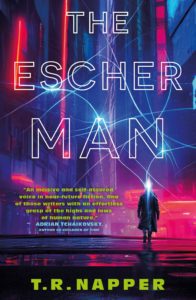
The protagonist of The Escher Man is unreliable. It’s a first-person PoV from a man who has been subjected to memory wipes, memory edits, and wholly false memory implants. From a technical perspective this is particularly challenging and one of the reasons, I think, the novel took so long to write.
One reviewer put it like this: “Honestly, it’s amazing that this comes across as anything but nonsensical. Endel’s life has been well and truly fucked up, and his mind is basically just scrambled eggs. To relate this—along with any kind of intricate plot—in an understandable way is amazing, but the author manages it. Very well, in fact.”
I simply wasn’t good enough to pull it off when I began. But the solution was simple: all I had to do was work on my craft for a decade.
There is something similar here to the experience of writing Ghost of the Neon God. The muse would not let me leave The Escher Man alone, even after I’d gained and lost an agent over it (that is, an agent took on this novel, said he loved it. Tried to sell it, couldn’t. Afterwards said he didn’t really like it all that much, actually. What a cunt). I’d think about the book from time to time, even though I considered it trunked. Go back, every few months, and jot down a few reminders on the first page of the manuscript. It was a good story, that I believed.
Observation one: hone your craft, always. Push yourself with ambitious ideas, study the books you read, and write as much as you can.
Observation two: dogged persistence is king. Yes, as Logen Ninefingers says, “You have to be realistic about these things.” Yes, sometimes a book really should be trunked, and I trunked the first two I wrote. But persistence in this industry is perhaps the most underrated of qualities. Persisting through the awful first drafts, the inevitable rejections, the indifference of one of the most competitive careers on Earth. Sometimes, the author that makes it is the one with the highest pain threshold.
That’s it: there’s no one way to write a novel, no one ring to rule them all. You learn by doing in this business, you write and write and write and your method begins to reveal itself. Live the creative life, study that of others.
Over to you.
The Escher Man is available in all good bookstores everywhere, Amazon (sigh, also everywhere), and here, for US readers.
Aliens: Bishop, likewise, is available in all good bookstores everywhere, Amazon, and here, for US readers.
Ghost of the Neon God, is available in all the same, and here, for US readers.
